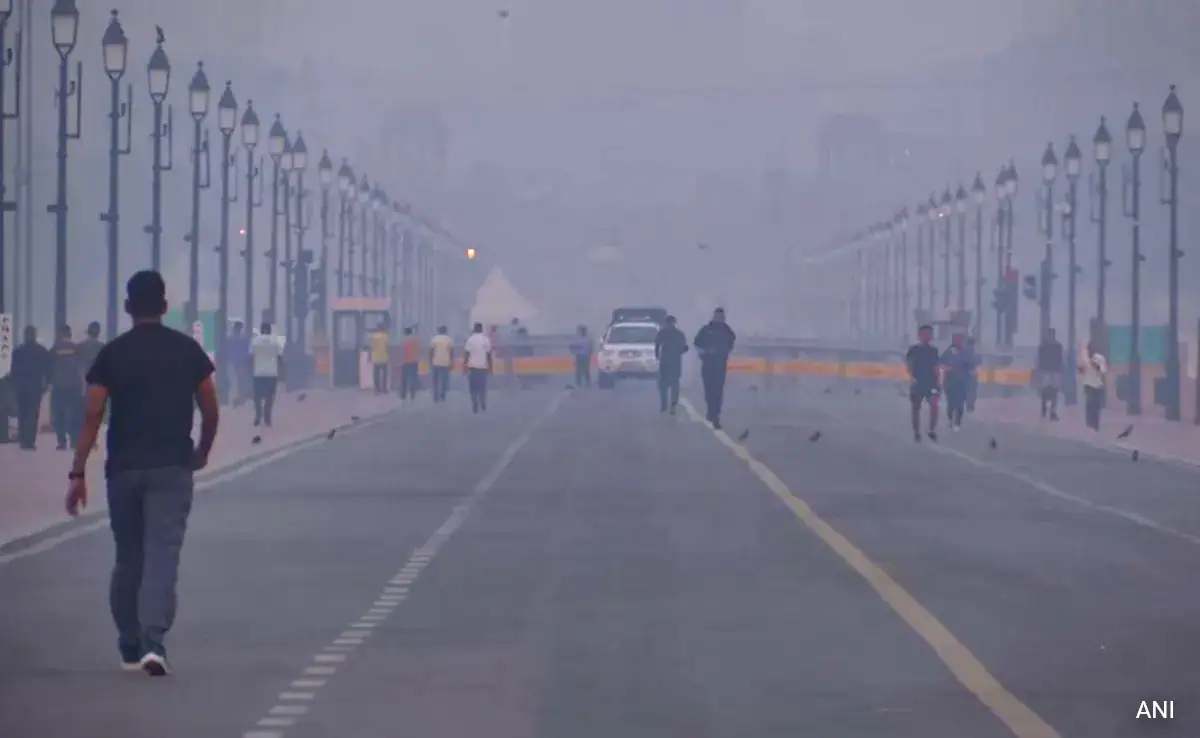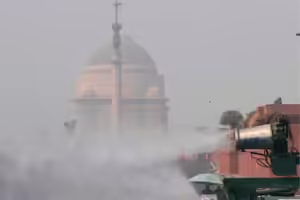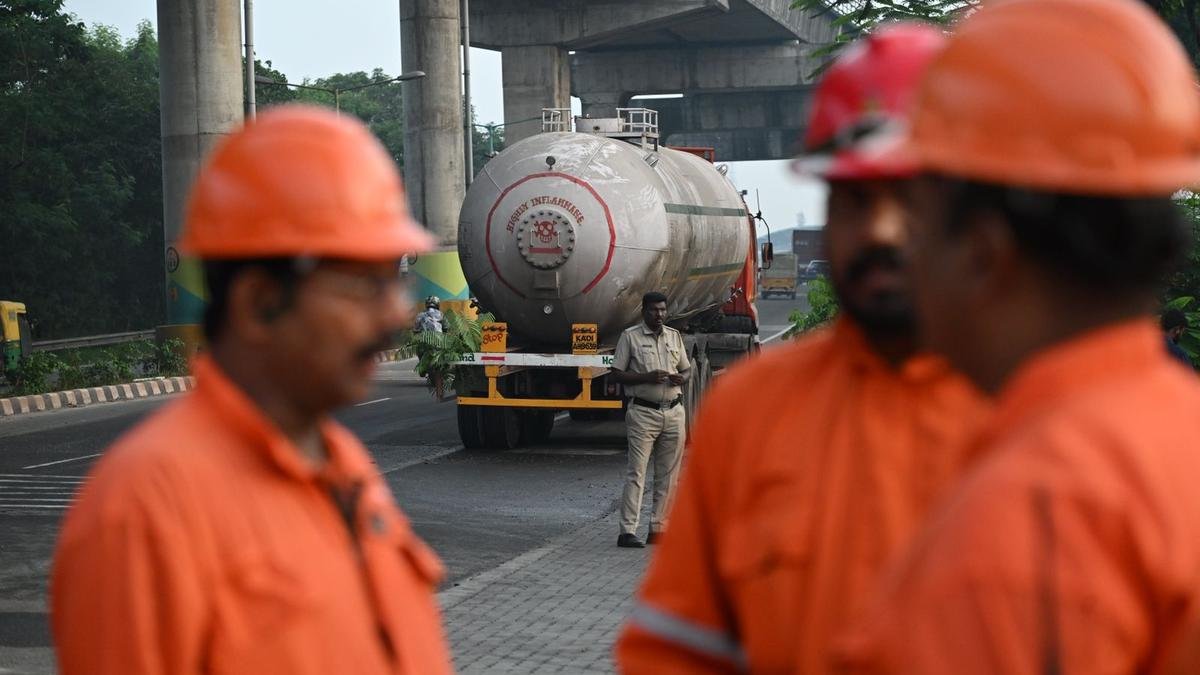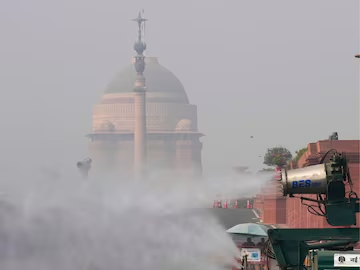GRAP Stage 2 Invoked In Delhi-NCR As Air Quality Worsens. What It Means

The air quality index reading for Delhi this morning was 317, categorizing it as “very poor.
In New Delhi, the Commission for Air Quality Management (CAQM) has activated stage two of the anti-pollution plan GRAP today as the air quality index (AQI) in the city has deteriorated over the past few days.
According to the latest real-time information released by SAFAR (System of Air Quality and Weather Forecasting and Research), the Air Quality Index (AQI) in Delhi stood at 317 at 8 am, categorizing it as “very poor”. AQI classifications range from 0 to 50 for good, 51 to 100 for satisfactory, 101 to 200 for moderate, 201 to 300 for poor, 301 to 400 for very poor, 401 to 450 for severe, and above 450 for severe-plus.
The India Meteorological Department (IMD) has predicted that Delhi’s daily average Air Quality Index (AQI) will remain in the ‘very poor’ range due to adverse meteorological and climatic conditions. The increase in pollution levels in Delhi, particularly during the post-harvest period of October and November, is frequently attributed to stubble burning in neighboring Haryana and Punjab.
In the second phase of the Graded Response Action Plan (GRAP), limitations will be imposed on the utilization of coal, firewood, and diesel generator sets within the Delhi-National Capital Region (NCR).
Daily mechanical sweeping and water sprinkling will occur on specified roads, with the addition of enforcing dust control measures at construction and demolition areas.
Furthermore, congestion points will have traffic personnel stationed, private transport will be deterred through higher vehicle parking fees, and extra bus and metro services will be introduced.
Suggested revision: To reduce air pollution, individuals are encouraged to opt for public transportation over using private cars. Moreover, it is recommended to adhere to the scheduled replacement of air filters in vehicles and steer clear of dusty construction operations between October and January.
Delhi-NCR residents have also been advised against engaging in the open burning of solid waste and bio-mass.
In addition to the measures of GRAP Stage 1, which have been active since October 15, these steps have been implemented. Stage 1 involves regular mechanized sweeping and road watering, along with dust control at construction sites. Furthermore, activities such as open waste burning, the utilization of coal or firewood in eateries, and the usage of diesel generators are restricted.
Stage 3 Restrictions: What You Need to Know
When the Air Quality Index (AQI) falls within the range of 401 to 450, Stage 3 of the GRAP is activated, triggering a set of actions.
- Enhancing the frequency of mechanized road sweeping, daily water sprinkling, and application of dust suppressants before peak traffic times at road intersections and high-traffic areas.
- Enhance public transportation services by adjusting fares to promote travel during non-peak hours.
- Cease all operations involving mining and crushing of stones.
- Restrictions have been imposed on LMVs (4-wheelers) running on BS III petrol and BS IV diesel, as well as on Medium Goods Vehicles (MGVs) registered in Delhi that operate on diesel meeting only BS III standards. Additionally, lower than BS III diesel-fuelled Light Commercial Vehicles (LCVs) from areas outside Delhi are prohibited from entering the city. Moreover, Inter-State buses originating from NCR states must utilize EVs, CNG, or BS VI diesel to be granted entry into Delhi.
- Proposed consideration of ceasing in-person schooling for students up to Grade 5.
- Restrictions tightened on construction and demolition operations.
When the Air Quality Index exceeds 450, limitations are imposed during Stage 4.
Once the Air Quality Index (AQI) in Delhi surpasses 450, Stage 4 of the GRAP is activated due to the severity level being categorized as severe-plus.
The subsequent actions that follow are as follows:
- Restrictions in Delhi prevent truck entry. Prohibition on construction and demolition activities for infrastructure projects like highways, roads, and power lines. Potential suspension of in-person classes for certain grades. Offices may operate with 50% capacity, while the rest work remotely. States could implement further measures like shutting colleges and non-essential businesses, and regulating vehicle movement based on registration numbers. Vulnerable individuals urged to avoid outdoor activities and remain indoors.Entry of trucks into Delhi is stopped.
- Ban on construction and demolition activites for linear public projects such as highways, roads, flyovers, overbridges, power transmission, pipelines, telecommunication etc.
- The government can discontinue physical classes, including for Classes Vl – lX and Class Xl.
- The government can take a decision on allowing public, municipal and private offices to work on 50% strength and the rest to work from home.
- State governments may consider additional emergency measures like the closure of colleges/educational institutions and closure of non-emergency commercial activities, permitting the running of vehicles on the odd-even basis of registration numbers etc.
- Children, the elderly and those with respiratory, cardiovascular, cerebrovascular, or other chronic diseases to avoid outdoor activities and stay indoors.
The Delhi government initiated its campaign against air pollution by introducing the “Red Light On-Gaadi Off” program on Monday.
Initiating the campaign from the ITO intersection, Gopal Rai, the Environment Minister of Delhi and a prominent member of the Aam Aadmi Party (AAP), implored motorists to combat pollution by switching off their engines when stopped at red lights.
Mr. Rai mentioned the establishment of a green war room by the Delhi government to tackle pollution. Additionally, an anti-dust campaign has been initiated to manage dust pollution, and over 5,000 acres are being treated with bio-decomposer to decompose stubble.














